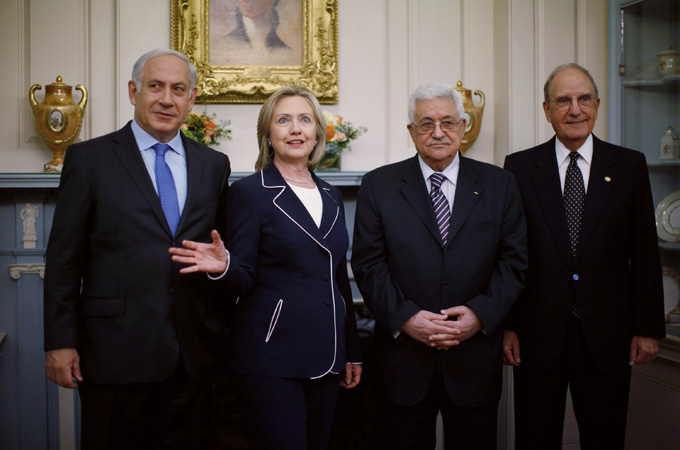Middle East talks set to continue
Israeli and Palestinian leaders agree to meet regularly to form a framework for peace.

 |
| Netanyahu and Abbas both condemned violence against civilians and pledged to work towards two states [AFP] |
Israeli and Palestinian leaders have launched a new round of peace negotiations, holding their first direct talks in nearly two years at a US-sponsored summit in Washington, DC.
Mahmoud Abbas, the Palestinian president, and Binyamin Netanyahu, the Israeli prime minister, agreed on Thursday to meet again in the Middle East on September 14-15, and every two weeks thereafter.
George Mitchell, the US Middle East peace envoy, told reporters the initial meeting between the two sides at the US state department had been “long and productive”, reflecting “good faith and seriousness of purpose”.
He said both Netanyahu and Abbas condemned “all forms of violence that target innocent civilians” and pledged to work together to maintain security.
They also renewed their commitment to a two-state solution, which entails the creation of a Palestinian state alongside Israel.
Mitchell said few details of the discussions were being released, due to their sensitive nature.
However, a Palestinian spokesman told the AFP news agency that Abbas would pull out of the talks if settlement expansion resumes.
“The president clearly told him that if there is no halt to the settlements, we will not be able to continue with the negotiations,” the agency quoted Nabil Shaath as saying.
Talks ‘not easy’
Hillary Clinton, the US secretary of state, formally opened the summit on Thursday morning, saying the United States “cannot and will not impose a solution” to the conflict.
| in depth | |||||||||||||||||||||||
|
“I know the decision to sit at this table was not easy,” Clinton told Abbas, and Netanyahu, who were seated on either side of her at the state department.
“By being here today, you each have taken an important step toward freeing your peoples from the shackles of a history we cannot change and moving toward a future of peace and dignity that only you can create.”
Both the Palestinian and Israeli leaders are facing heavy pressure from within not to cede too much to the other.
Netanyahu followed Clinton’s remarks, saying the talks would “not be easy”, adding that “a true peace, a lasting peace, [would] be achieved only with mutual and painful concessions from both sides”.
“We expect you to be prepared to recognise Israel as the nation state of the Jewish people,” the Israeli prime minister told Abbas.
Abbas, in turn, reiterated Palestinian demands that Israel halt its construction of illegal settlements and end an economic siege of the Gaza Strip.
But he said the Palestinians recognise the need for security. “We want to state our commitment to follow on all our … engagements, including security and ending incitement,” Abbas said.
Barack Obama, the US president, made an appeal to the Israeli and Palestinian leaders on the eve of the Washington summit to not let the chance for peace slip away, and pledged to put the “full weight” of the United States behind the effort to forge peace.
‘Cautiously hopeful’
“As I told each of them today, this moment of opportunity may not soon come again. They cannot afford to let it slip away,” Obama said after one-on-one talks with Netanyahu and Abbas on Wednesday.
“I am hopeful, cautiously hopeful, but hopeful,” the US president said later with the leaders of Jordan, Egypt, Israel and the Palestinians beside him in the crowded East Room of the White House.
Obama and Clinton have expressed hopes of securing a deal between the two sides within a year’s time – the deadline given by Abbas for the current round of negotiations.
Among the roadblocks talks face are anger and outrage on both sides of the separation wall.
Hamas, the group democratically-elected to govern, but which only exercised control over the Gaza Strip following Palestinian in-fighting, has already rejected any possible outcome of the talks, in part because they have not been included.
The armed wing of Hamas has in recent days begun attacking Israeli settlers in the West Bank – killing four on Tuesday – and vowing to continue.
About half a million people live in Israeli settlements scattered across the West Bank, as well as in East Jerusalem, under the protection of Israel’s military.
Netanyahu faces pressure from within his government not to halt the expansion of those settlements – or continue a temporary freeze – and his governing coalition could collapse if he loses the support of right-wing groups.
